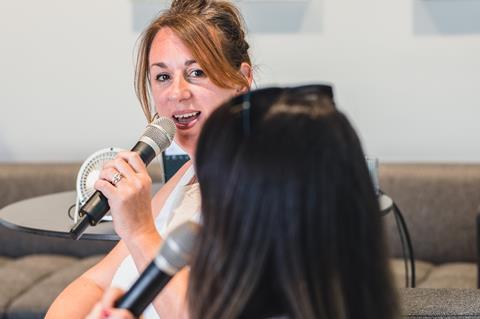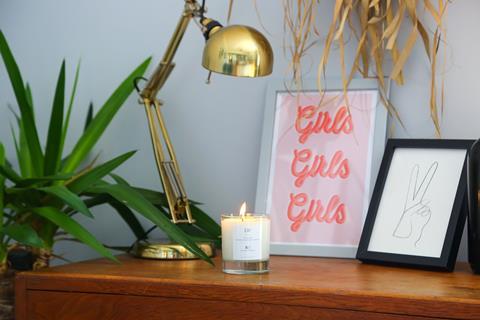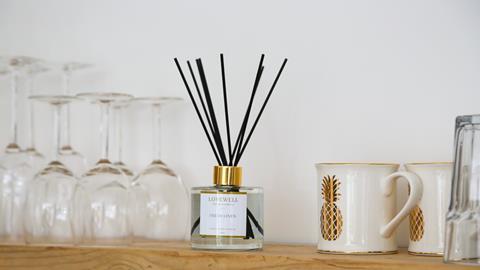The story behind LoveWell, a beauty brand whose products are created by women who have experienced trafficking or sexual exploitation
Bristol is a thriving, affluent city, rich in history and culture, but it is also home to hundreds of women who are working in the sex industry or trapped in trafficking and exploitation. Through her charity LoveWell, Claire Dormand and her team are supporting women who want to move on from sex work or other traumatic experiences, providing transformative training so they can develop the transferable skills and confidence they need to successfully enter employment.
Addressing an ongoing problem
Claire’s friend Rosie started a charity in Bristol called Beloved in 2006 (beloved.org.uk), which aims to show God’s love to the workers in massage (sex) parlours by befriending them, offering prayer, support and signposting to services like English classes or sexual health clinics. When a lady she had helped to leave sex work turned up back at the parlour two years later, Rosie realised there was a much bigger problem that needed addressing.
The lady who had left the parlour could only access low-skilled, low-paid work, so when her washing machine broke down, she felt she had no choice but to return to the parlour to earn money. Longer-term support was needed so that women could enter skilled work, gain economic stability and not end up back where they started.
One day, Rosie noticed some of the beauty products in Ann Summers had some very sexual branding and names, and it sparked an idea. What about starting a beauty brand that has positive, truth-affirming names for its products? And what if this brand could employ women leaving sex work and support them as they enter the job market?
Next, Rosie got connected to Tumi, who was a cosmetic scientist working for big beauty brands, who’d had a similar idea when she had met a lady at her church’s soup kitchen in Exeter. As Tumi befriended this lady, who was living on the streets, she listened to her talk about how she didn’t want a handout, she wanted to work, and if only someone could support her in getting into employment.
Rosie and Tumi held a meeting in a church in Bristol, and started dreaming: what could a beauty enterprise that supports women on the fringes look like? Enter Claire, who moved to Bristol in 2017, and had just started a very small business called the Barrel Skincare Company, teaching people how to make their own beauty products.
It was a match made in heaven! Rosie had the charitable expertise, Tumi the beauty product development knowledge and, heavily pregnant with her second child, Claire brought the business element as well as her years of experience in women’s work from Leeds. LoveWell was born, and in 2018 became an unincorporated association.
They managed to secure some donations from local businesses and invited women who were already accessing other support from similar organisations in Bristol to join a pilot workshop in skincare and beauty production, and employability skills.
Claire comments: “We just had lots of fun. We made body glitter, lipsticks, lip balms, candles and all sorts of things. One woman had been working all night in a parlour, so she had some speed to keep her awake. Another woman who’d taken too much cocaine was falling asleep! They all got a certificate at the end, and a voucher to show our appreciation for being a pilot group.”
The women all wanted to continue, so LoveWell ran training through the summer, and Claire spent the winter fundraising, until the company was able to bring her on one day a week in a paid capacity.
Throughout 2018, LoveWell focused on feedback from the women, and winter 2018 saw the first 250 products developed, with 50 candles, 50 bath oils, 50 bath salts and 50 aromatherapy roll-ons.
“We worked with two of the women from the workshops, who got vouchers for their time, and a whole host of volunteers. We had a little office in a church. We used the church hall and the tables to make the products, we designed all of the packaging and card labels – it was completely DIY handmade stuff, but they still looked really good and professional.”
LoveWell then sold the products through local Christmas markets, Facebook and friends’ networks, and made a small profit.

Developments and challenges
The next year, in 2019, Rosie and Tumi felt that other things were pulling them in different directions – for Rosie her charity Beloved was growing from strength to strength, and for Tumi, a move back to London was calling. They stepped down from LoveWell (remaining firm friends and supporters) while Claire continued to focus on funding bids and unsuccessfully tried to register the organisation as a charity several times.
“It was really tough to attempt this on my own. My advice to anyone registering a charity is to find the money to pay a solicitor who specialises in the Charity Commission to help you do it.”
Claire planned to run a full pilot of the training and product-making in May 2020, but then the pandemic hit: “Everything went out the window and I thought: what on earth are we doing here now? It was kind of back to the drawing board a little bit!”
Around this time, a trustee steering board emerged, and a lot more grant funding was secured during the pandemic, so in September 2020, LoveWell registered as a Community Interest Company (CIC) so the company could pay five women a salary to come on board and train on a six-month programme. “They learned a lot about themselves, lots of life skills, lots of employability skills and made the products en masse at the same time. The vision was for women to be able to build their skills and confidence to go into employment that would help them flourish.”
The vision was for women to be able to build their skills and confidence to go into employment that would help them flourish
In 2023, LoveWell became a registered charity, and expanded the criteria for who can access the training: “Originally it was just for women in parlours, but actually that’s a limited number of women in lots of ways. Now we accept women who have any experience of trafficking or sexual exploitation, including asylum seekers.”

A charity with a message for the women it works with
Despite a woman of faith at the helm, LoveWell isn’t a Christian organisation per se, and women from all faiths or none are welcome in the programmes. Claire recognises sex work as ‘work’ and that some women choose it as a means to support their education, etc, but says: “LoveWell is here for the women for whom sex work is disempowering, marginalising and they want to get out.”
Today, LoveWell has worked with over 70 women, and over 30 through its six-month programme. LoveWell has employed 13 women so far – including one of the women who attended the pilot course, who is now the LoveWell training facilitator. In the UK as a refugee, she got her legal status the day she signed her contract with Lovewell!
In 2025, LoveWell closed the CIC and now solely operates as a charity. All profit from the sales of the LoveWell beauty products goes directly back into the charity, providing a trading income stream. Because it’s the women on the LoveWell programme making the products, it’s very rewarding to see the direct fruits of their labour making a difference. Claire is working to make the programme accredited so attendees will get a level one award in enterprise and employment. They also get mentoring support for a year post-completion, and lifelong access to the LoveWell community.
The vision was for women to be able to build their skills and confidence to go into employment that would help them flourish
“The key statistic that I’m really proud of is that despite so many barriers to success our women face, such as poverty, caring responsibilities, very low self-worth, physical disabilities and mental health challenges, 70 per cent of those we’ve supported through the programme are in paid employment within 12 months.”
In giving the women the opportunity to develop their skills, LoveWell shows them that they are worth believing in. As a woman of faith, Claire wants to impart to each woman in the programme her value as a person: “You have something to offer this world. You deserve to be part of a community. You deserve to be part of society.”
Even though she works four days a week, Claire does a considerable number of extra hours, which has been recognised and funding is being sought to pay her for those. In the future, Claire would love to see LoveWell grow so it can offer more programmes around Bristol. She would also like to grow LoveWell’s connection to local churches in the next year. lovewelluk.com
Words by Becky Hunter-Kelm





























No comments yet